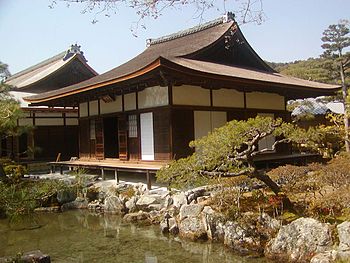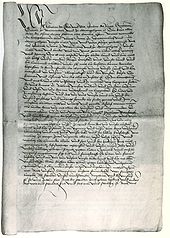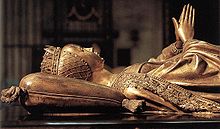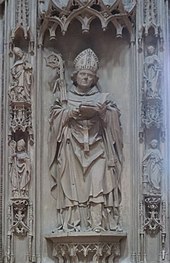1482
Portal History | Portal Biographies | Current Events | Annual Calendar | Article of the day
◄ |
14th century |
15th Century
| 16th Century
| ►
◄ |
1450s |
1460s |
1470s |
1480s
| 1490s
| 1500s
| 1510s
| ►
◄◄ |
◄ |
1478 |
1479 |
1480 |
1481|
1482
| 1483
| 1484
| 1485
| 1486
| ►
| ►►
| 1482 | |
|---|---|
| Tízoc becomes ruler of the Aztec city of Tenochtitlán . |
In the Treaty of Arras , Burgundy is divided. |
|
Shōgun Ashikaga Yoshimasa built Ginkaku-ji as his retirement home. |
|
| 1482 in other calendars | |
| Armenian calendar | 930/931 (July turn of the year) |
| Ethiopian calendar | 1474/75 |
| Aztec calendar | 2nd house – Ome Calli (until the end of January/beginning of February: 1st flint – Ce Tecpatl ) |
| Buddhist calendar | 2025/26 (Southern Buddhism); 2024/25 (alternative calculation according to Buddha's parinirvana ) |
| Chinese calendar | 69th (70th) cycle
Year of the Water Tiger壬寅 ( at the beginning of the year Metal Ox 辛丑) |
| Chula Sakarat (Siam, Myanmar) / Dai calendar (Vietnam) | 844/845 (New Year's April) |
| Iranian calendar | 860/861 |
| Islamic calendar | 886/887 (New Year's Eve February 19th/20th) |
| Jewish calendar | 5242/43 (September 13/14) |
| Coptic calendar | 1198/99 |
| Malayalam calendar | 657/658 |
| Seleucid era | Babylon: 1792/93 (April turn of the year)
Syria: 1793/94 (October turn of the year) |
| Spanish era | 1520 |
| Vikram Sambat (Nepalese calendar) | 1538/39 (April turn of the year) |
events
politics and world affairs
Portuguese voyages of discovery
- January 21: The Portuguese , under Diogo de Azambuja, lay the foundation stone for what later became Fort São Jorge da Mina or Elmina on the Gold Coast in present-day Ghana .
- The Portuguese navigator Diogo Cão was the first European navigator to reach the area of the Congo estuary and today's Angola . As a result, commercial branches are established. The discoveries of Cao are the prerequisite for Bartolomeo Diaz's voyage of discovery in 1488, on which he reaches the Cape of Good Hope .
reconquest
- February 28: Spanish troops under the command of Rodrigo Ponce de León capture the Moorish fortress of Alhama de Granada in the Emirate of Granada during the Reconquista . A few days later, the Emir of Granada, Abu l-Hasan Ali , made an attempt to recapture it. An army of the Duke of Medina-Sidonia comes to the aid of the troops of the Marquis of Cadiz, so that Abu l-Hasan Ali is forced to give up the reconquest. When King Ferdinand V intervenes in the conflict at the head of an army, the confrontation loses the characteristic of the hitherto customary raids and becomes a war of Castile against the Emirate of Granada .
- The first major clash of the enemy occurs in June off Loja , when the Spanish army, which has not yet completed the preparations to besiege the town, is attacked by the Moorish light cavalry and, as they retreat, are crushed by more Moorish troops. King Ferdinand withdraws to Córdoba with the rest of his army .
- While Abu l-Hasan Ali is still fighting the Christian attackers, his son can be identified as Muhammad XII. proclaimed ruler of the emirate. During Muhammad XII. ruled in Granada , his father ruled Ronda and the western part of the emirate.
Duchy of Burgundy

- March 6: Duchess Maria von Burgundy suffers a riding accident, from which she dies on March 27. After her death, the city of Ghent rose up against her husband Archduke Maximilian von Habsburg as guardian of their children Philipp and Margarete . At the same time, he had to defend himself against renewed French claims to the Duchy of Burgundy .
- December 23: In the Peace of Arras, France's King Louis XI. and Archduke Maximilian their claims in relation to Burgundy . The once great duchy is divided up . The Duchy of Burgundy, the Free County , the Artois and some smaller dominions fall to France, and the city of Arras and Picardy , which has been occupied since 1477, remain in French possession. Maximilian regains Flanders . In addition, both sides agree on the subsequent marriage between Maximilian's daughter, Margarethe, who was just two years old, and the 13-year-old French Dauphin Karl . However, this plan is not realized.
Other events in the kingdom
Diether von Isenburg , Archbishop and Elector of Mainz and thus Archchancellor of the Holy Roman Empire at the same time , dies on 7 May. Adalbert von Sachsen becomes his successor the very next day . However, since at 15 he is not yet the formal age to be ordained a bishop, he is only used as an administrator for the time being.
The Münsinger Treaty of December 14 reunited the two parts into which the County of Württemberg had been divided since the Nürtinger Treaty of 1442. The inheritance disputes between the Uracher and the Stuttgart part are thus settled after 40 years. Count Eberhard V. im Bart , residing in Urach , takes over the government of the country and moves his residence to Stuttgart , the capital of the other part of the country. The line of succession is based on the incumbent Count in the Stuttgart part of the country, Eberhard VI. fixed. The contract, which was negotiated with the participation of representatives of the Württemberg estates , stipulates the indivisibility of the state and the primogeniture in Württemberg in a legally binding manner . The Münsinger Treaty prevents the fragmentation of Württemberg and thus creates an important prerequisite for the elevation of Württemberg to a duchy in 1495.
Italy
- August 21: Papal troops under the command of Roberto Malatesta win the Battle of Campomorto against the army of Naples under Duke Alfonso of Calabria .
Asia
- After the death of Yakshya Malla , his son Raya Malla becomes the ruler of the Malla Empire with the capital at Bhaktapur .
America
- Axayacatl , ruler of Aztec city Tenochtitlán , dies aged 30. He is succeeded by his older brother Tízoc . The campaign, traditionally carried out for the accession to the throne for the purpose of capturing warriors, an attack on the northeastern small state of Mextitlán fails, which permanently damages Tízoc's reputation.
science and culture
- June 28: The first book printed there appears in Munich , the pilgrim guide Indulgentiae ecclesiarum principalium urbis Romae from the office of Johann Schaur .
- July 16: In Ulm, Lienhart Holl prints the first German world atlas , the Cosmographia of Claudius Ptolemy in the edition of Nicolaus Germanus . (Four years later, this work by Johann Reger, which was extremely important for the development of German cartography, was printed in Ulm for the second time.)
- 1482/1487: Sandro Botticelli completes the painting Primavera . The picture is one of the best-known and most frequently reproduced works of Western art.
religion
- August 2: John XX. von Dalberg is elected Bishop of Worms as successor to Reinhard I von Sickingen , who died on July 21 . He was only 27 years old when he was elected and had not yet reached the age of 30 required by canon law. But he received a papal dispensation.
Born
date of birth saved
- April: Georg Tannstetter , German humanist, astronomer, astrologer and physician († 1535)
- June 29: Maria , Princess of Spain and Queen of Portugal († 1517)
- 7 October: Ernst , Margrave of Baden († 1553)
- October 18: Philip III. von Hanau-Lichtenberg , Count of Hanau-Lichtenberg († 1538)
- 9 December: Frederick II , Elector Palatine († 1556)
Exact date of birth unknown
- Catherine d'Amboise , French poet and patron (died 1549)
- Augustine , Bishop of Grasse († 1532)
- Abraham ben Solomon of Torrutiel , Spanish historian († unknown)
- Jo Gwang-jo , Korean politician and Neo-Confucian philosopher (died 1519)
- Agostino Mainardi , Italian reformer from Chiavenna (died 1563)
- Johannes Oekolampad , Basel reformer († 1531)
Born around 1482
- Christian Beyer , German legal scholar († 1535)
Died
Date of death secured
- January 22: Arnold von Unkel , auxiliary bishop in Cologne
- March 25: Lucrezia Tornabuoni , Florentine poetess, wife of banker and politician Piero di Cosimo de' Medici (b. 1425)
- March 27: Maria , Duchess of Burgundy in her own right, also Duchess of Luxembourg, Brabant, Limburg and Guelders, Margravine of Antwerp, Countess of Chariolais, Flanders, Artois, Holland, Zeeland, Hainaut and Zutphen and wife of Maximilian of Austria (* 1457)
- April 14: Conrad III. von Pappenheim , Saxon nobleman, Jägermeister under Duke Wilhelm III, ducal councilor and Saxon steward
- 7 May: Diether von Isenburg , Archbishop of Mainz (b. 1412)
- May 8: Ludwig von Rothenstein , Swabian nobleman
- May 23: Mary of York , English princess (b. 1467)
- July 7: Marinus de Fregeno , papal legate, dealer of indulgences and bishop of Cammin
- July 7: John Louis of Savoy , Administrator of the Archdiocese of Tarentaise and the Diocese of Geneva (b. 1447)
- July 16: Jan van Schaffelaar , Dutch folk hero (b. c. 1445)
- 21 July: Reinhard I von Sickingen , Bishop of Worms (b. c. 1417)
- 25 July: Wilhelm I , Duke of Brunswick-Lüneburg and Prince of Brunswick-Wolfenbüttel (b. 1392)
- August 22: Mechthild of the Palatinate , Countess of Württemberg and Archduchess of Austria (b. 1419)
- August 25: Margaret of Anjou , wife of Henry VI. of England and regent (* 1429)
- September 10: Federico da Montefeltro , Italian condottiere (b. 1422)
- 18 September: Philippe I de Croÿ , Count of Chimay, Burgundian politician (b. 1436)
- 22 September: Philibert I , Duke of Savoy (b. 1465)
- 25 October: Peter II of Luxembourg , Count of Saint-Pol, Brienne, Marle and Soissons (b. c. 1440)
- 18 November: Gedik Ahmed Pasha , Grand Vizier of the Ottoman Empire
- December 31: Johannes Lecküchner , German clergyman and fencing instructor
Exact date of death unknown
- Axayacatl , ruler of the Aztec city of Tenochtitlán
- Hugo van der Goes , Dutch painter (b. c. 1440)







